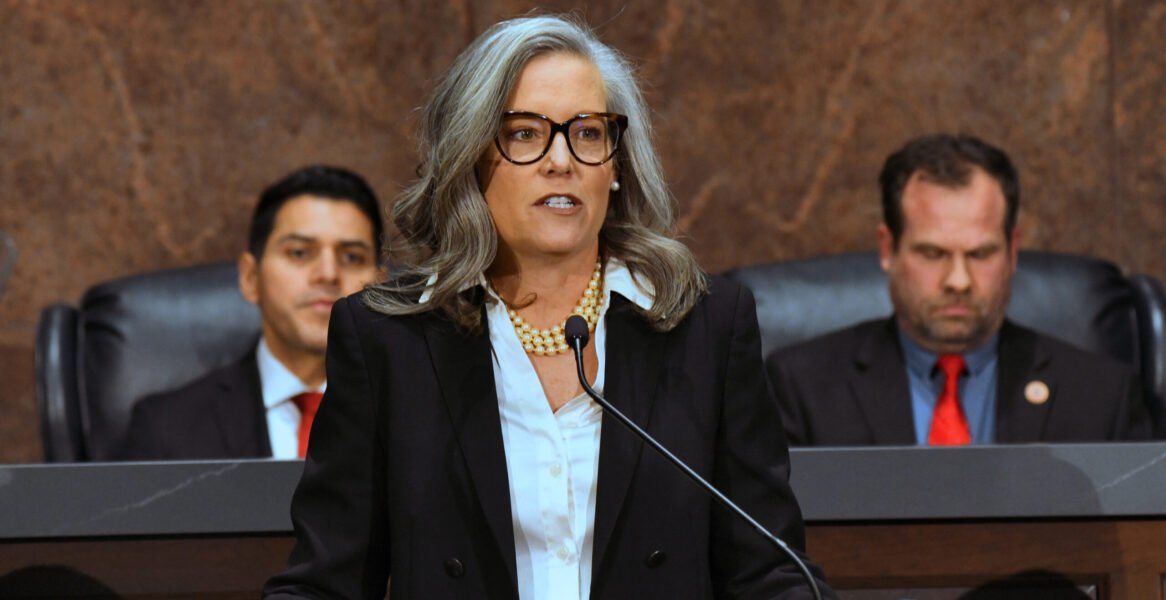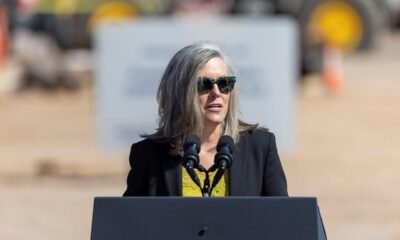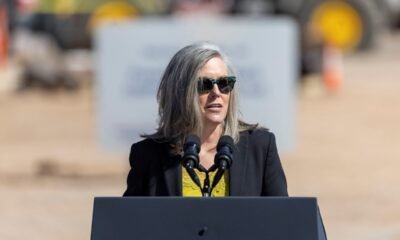budget
Hobbs Blocks House Budget Extension Just Days Before Critical Deadline

In a significant move, Governor Katie Hobbs has vetoed the House’s proposed continuation budget, creating urgency among legislators to devise a viable proposal before the looming government shutdown on June 30.
This decision follows a protracted standoff between the governor’s office and both legislative chambers. Disagreements arose over which of the three budget proposals—two from the House and one from the Senate—should proceed to her desk.
Hobbs previously vetoed an earlier House budget draft, which had passed along party lines on June 13.
“I have long made it clear that the House Republican budgets are unacceptable. They jeopardize public safety, undermine healthcare, and disregard our veterans,” Hobbs stated in a June 25 announcement.
Late on June 24, the House passed a continuation budget that members characterized as a compromise aimed at preserving state operations while further negotiations take place. However, the Senate’s bipartisan budget, which Hobbs appears to support, has yet to be voted on by the House.
House Republicans expressed skepticism about garnering adequate support for the bipartisan plan, citing the continuation budget as a necessary fallback to avoid a shutdown.
A continuation budget essentially extends the previous year’s budget without introducing new spending items.
The initial proposal from the House amounted to $17.3 billion, while the Senate’s version was $17.6 billion, reflecting negotiations with the governor’s office. The House’s plan did not undergo such discussions.
“This is the second time the majority of members have raised concerns over government spending patterns, which they label as wasteful,” said House Speaker Steve Montenegro, R-Goodyear.
On June 25, the Senate managed to pass both House budget packages in a rapid fashion, employing mass motions that circumvented regular rules.
Senate President Warren Petersen, R-Gilbert, heavily criticized colleagues opposing the bipartisan agreement, labeling them inexperienced and easily misled.
“The consequences of this charade include diminished chances for future success and wasted time,” Petersen remarked.
The continuation budget notably lacks crucial priorities included in the House’s first budget proposal, such as pay raises for public safety officers and vital transportation projects.
House Minority Leader Oscar De Los Santos, D-Laveen, denounced the continuation budget as a “colossal waste of time,” arguing it cuts funding for key public services compared to previous proposals.
Livingston acknowledged that talks are ongoing among House and Senate leaders about alternative budget plans with the governor’s office but expressed doubt that anything other than the continuation budget could receive her approval.
“This is (Hobbs’) last chance to act,” he remarked, emphasizing the need for essential funding.
Rep. Justin Olson, R-Mesa, expressed concern that even the continuation budget involved excessive spending, reflecting a 5.7% increase over last year’s budget.
“Growing government at an unsustainable rate is fiscally irresponsible,” he commented.
While all House Republicans voted in favor of the continuation budget, some voiced criticism of the process employed by both House and Senate leadership.
Members of the House and Senate Freedom Caucus took issue with the bipartisan budget, suggesting GOP leadership had capitulated to the governor.
“This bill is positioned for an eventual veto by Hobbs, serving merely as a distraction,” stated Rep. Alexander Kolodin, R-Scottsdale.
Kolodin dubbed the continuation budget “reasonably conservative,” which influenced his vote.
Rep. Teresa Martinez, R-Casa Grande, criticized her party’s leadership for the late introduction of the budget.
As of now, the Arizona Legislature is racing against time, facing uncertain prospects for delivering an approvable budget. While the Senate’s budget is likely to align with Hobbs’ views, its acceptance by the House remains uncertain.

















